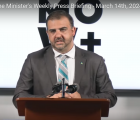 Washington D.C. 1st August 2012 Delivered by Fred Mitchell, Minister of Foreign Affairs
Washington D.C. 1st August 2012 Delivered by Fred Mitchell, Minister of Foreign Affairs
Mr. Chairman: I have been asked to come to Washington to take the deliberate step to give the country’s response to the report by the observer team of the Organisation of American States of the General Election held in The Bahamas on 7th May 2012. We believe that such a considered response is necessary having regard to this being the first time such a mission was invited to our country and having regard to the fact that the general election resulted in a change of administrations.
The report is accepted by the government of The Bahamas without reservations and will be utilised by the government to plot the process of continued reform of the electoral process in The Bahamas. These reforms must necessarily be implemented within the parameters of international norms but also with full consultation with the Bahamian society as a whole.
We come here today to recommit our country to deepening democracy within our borders, a process that has been ongoing since 1729 when the first representative Parliament was established in Nassau. The first franchise for voters included white men of property, then was expanded to all men of property and in 1962 to women. The property and company votes were abolished by the time of the 1967 general election.
The reason for establishing that time line is to show that there has been a steady and dynamic march toward inclusiveness in the exercise of the vote. The voting age was lowered to 18 in 1969 which is where it remains today. There are however several observations that we would wish to make in response to the report. First, we believe that the report did not sufficiently address the issue brought to the attention of the monitors of the use of the power and resources of the government and the state to influence the election result of the general election.
This matter is to be addressed by our Parliament. Secondly, we take note of the observations about the participation of women in the electorate. The report indicates that there were 18,574 more women than men who registered to vote. Some 10 per cent more women than men. The report goes on to say that this is consistent with regional trends and it regrets that this has not translated into more women as candidates and members of parliament.
This statistic is important for many reasons. Our policy makers take note first of the importance of women in the process and the need for policies to reflect the gender balance in the electorate. It takes note of the need to improve the level of participation of women as candidates and as Members of Parliament. The government pledges to raise the level of participation of women as candidates and as Members of Parliament.
A programme of public education on this issue will follow. As a corollary to this however, we must seek to understand why the participation of men in the elections is dropping and seek to ensure that there is gender balance in this participation. The relative drop in male participation seems to be part of a wider and worrying trend affecting young male participation in many aspects of our national life. As an adjunct to this, the government at its most recent report at the United Nations on the Convention on the elimination of all forms of discrimination against women, reported additional steps that the government will take to ensure the fullest participation of women in the civic life of the country.
I announced in Parliament on Wednesday 25th July that the government proposes to amend the constitution to eliminate all the remaining forms of discrimination in the constitution based on gender which will allow the spouses of Bahamian women the same access to the rights of citizenship as the spouses of men now enjoy and to pass on their citizenship to their children which they cannot in certain circumstances now do.
This announcement has been broadly accepted by the population and we expect that when called upon to do so by referendum, the country will support the government’s proposals. I should add also that the report indicates that there were four women elected to the House of Assembly when in fact there were five women elected. We have also sought through the Senate to increase the participation of women in front line politics by appointments to that body.
At the United Nations in our report on the Convention on the Elimination of All Forms of Discrimination Against Women, we announced that the Women’s Bureau is now to be expanded upgraded and the nomenclature changed to the Department of Gender Affairs which will begin to address the issues facing the marginalization of men and boys. It is left only for me to thank the observers for their work in our country as the inaugural team of OAS observers. We believe that the process was useful for the country and trust that the process of reform will find favour with future observers who come to our country. Thank you Mr. Chairman.





